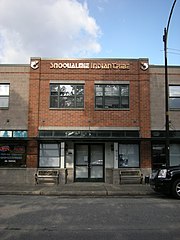Snoqualmie (tribe)

|
|
| Total population | |
|---|---|
| 1,500 | |
| Regions with significant populations | |
|
|
|
| Languages | |
| English, Southern Puget Sound Salish language | |
| Religion | |
| Christianity, traditional tribal religion | |
| Related ethnic groups | |
| Duwamish, Puyallap, Nisqually, Sammamish, Suquamish, Skykomish, other Salish peoples |
The Snoqualmie people (S·dukʷalbixʷ) are a southern Coast Salish Indigenous peoples of the Pacific Northwest Coast. Their homelands span the Snoqualmie Valley in east King and Snohomish Counties in Washington state.
Today, they are enrolled in the federally recognized tribes: Snoqualmie Indian Tribe and Tulalip Tribes of Washington.
The Snoqualmie are also known as the Snoqualmu, Snoqualmoo, Snoqualmick, Snoqualamuke, or Snuqualmi. Their autonym is Sduk-al-bixw, meaning "strong people of status."
Snoqualmie is a dialect of the Southern Puget Sound Salish language, which is a Lushootseed language, belonging to the Central Salish language family. It is shifting towards English.
Historically Snoqualmie people lived in 58 longhouses in 16 villages, with a population of 3,000–4,000. In the mid-19th century, their homelands had four districts: Monroe, Tolt, Fall City, and North Bend. They had an influential chief Patkanin.
Some Snoqualmies settled onto the Tulalip Reservation after signing the Point Elliott Treaty with the Washington Territory in 1855, but many remained in their ancestral homelands around the Snoqualmie Valley and Lake Sammamish. At that time they were one of the largest tribes in the Puget Sound region numbering around 4,000.
...
Wikipedia
